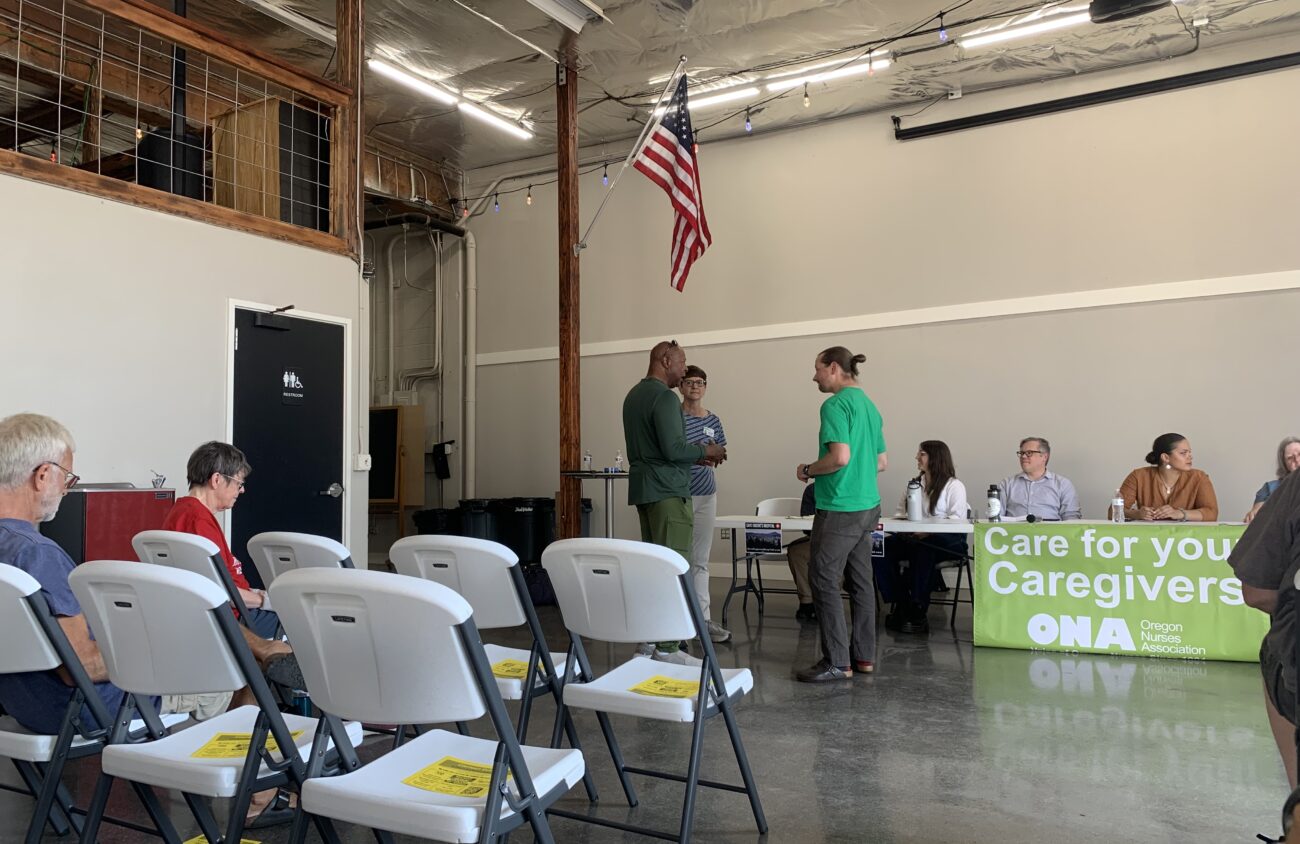On Tuesday, August 22, PeaceHealth announced the closure of its Sacred Heart University District hospital. PeaceHealth says the decision was made due to financial reasons citing a $2 million revenue loss per month.
PeaceHealth Chief Medical Officer Oregon Network Jim McGovern says in an email to Eugene Weekly, “Since RiverBend was built in 2008, we have reviewed numerous options to keep the University District hospital open but have found that further investment in the facility is not sustainable.”
After PeaceHealth announced its plans to close the University District hospital, executives asked the Oregon Health Authority to issue a waiver that would allow them to keep the Behavioral Health Unit open. According to the Oregon Nurses Association Town Hall Friday, Sept. 15, they have given the state until Sept. 20 to issue the waiver that would allow them to keep the Behavioral Health Unit and the inpatient rehab open. If OHA doesn’t respond within the time constraints PeaceHealth established, the Behavioral Health Unit will also shut down.
Kylie Shorack, an RN, was working when PeaceHealth announced that it was closing the University District hospital. After hugging her colleagues and “blubbering” over the gravity of Eugene losing its only hospital, Shorack says she wiped her tears and went back to the emergency room floor to assist a hospital “regular.” Shorack explains that regulars at this hospital are often mentally unstable, houseless or both and come to the University District hospital to just be.
“We call our regulars the ‘friendly face task force,’” Shorack says. “They’re an important part of this hospital, and they’re some of the people I fear for the most with this closure.”
As Shorack made her way to the floor, she says that one of her favorite regulars stood up seeing Shorack’s tear stained face and demanded to know who hurt her. Shorack explained the hospital was closing and that she and all the other nurses here would be preparing to relocate to the nearest hospital, RiverBend, which is 5.8 miles away from the downtown hospital.
“She started crying and she was like, ‘Where am I gonna go? This is the only place I feel safe,’” Shorack says.
Shorack says she took the woman back to her room, where they hugged and wept over the state of affairs and out of the corner of her eye Shorack saw McGovern across the hall.
Shorack says, “I looked at him and I said ‘What are you going to do for people like her? What is your plan for her?’” McGovern explained that he had a plan in place, but before he could finish, Shorack says the hospital regular cut him off to say, “No you fucking don’t. You don’t fucking care about me.”
Back in 2013, when PeaceHealth expanded its psychiatric unit at the University District, a Register-Guard article reported that Peter Adler, then senior vice president/chief strategy officer for PeaceHealth, said: “There is a crying need in the community (for this service). When we opened RiverBend (hospital in Springfield), we continued to make a commitment to the Eugene community to provide this.” He added, “This is pure mission for PeaceHealth. This is a promise made and a promise kept to Eugene, to Lane County, to the entire region. This is about passion and spirit; this is not about (profit) margins.”
CAHOOTS Crisis Responder Chelsea Swift says that a small percentage of the people she works with who are suffering from a mental health crisis actually make it to the Behavioral Health Unit and more often than not utilize the 11 hospital beds in the Emergency Department that PeaceHealth is stripping away.
Swift says, “When I say it is impossible to imagine what my job will look like without this hospital, those 11 psych beds are what I’m talking about.”
Shorack says PeaceHealth told the nurses that it will be transferring most of the medical staff at the University District hospital to RiverBend to assist with potential overcrowding, but Swift says she fears that more staff won’t be enough to take on the challenges that come with relocating an entire population of vulnerable people across the river.
“I expect more CAHOOTS work,” Swift says. “In the lobby of RiverBend, when someone is in a crisis because they have now waited 12 hours to be seen for a mental health crisis. That will be a CAHOOTS call to RiverBend.” Swift says that the long wait times for mentally unstable individuals could lead to more incidents of outbursts and potential arrests.
PeaceHealth’s press release regarding the closing states that it is “collaborating with community partners on alternative care models” to bridge the gap that the closure of the University District hospital will have on mental health services.
Swift points out that many of the mental health and rehab services in Eugene have been on the decline since the pandemic. She references Hourglass Community Crisis Center’s hours going from 24/7 to limited hours on the weekends from 8 am to midnight, and she says the Eugene Mission has closed public access, limiting some services to guests only. Swift says CAHOOTS has relied on the University District hospital “hundreds and hundreds of times over” due to the deficit of mental health services in Eugene.
“I will show up at my job and help anyone with non-judgment, with empathy and with care, and I truly believe that every person, regardless of how hostile or violent and upsetting, that even I find they’re doing their best and generally responding appropriately to the very insane conditions that we’re all expected to operate well under,” Swift says. “But I won’t always be there.”
